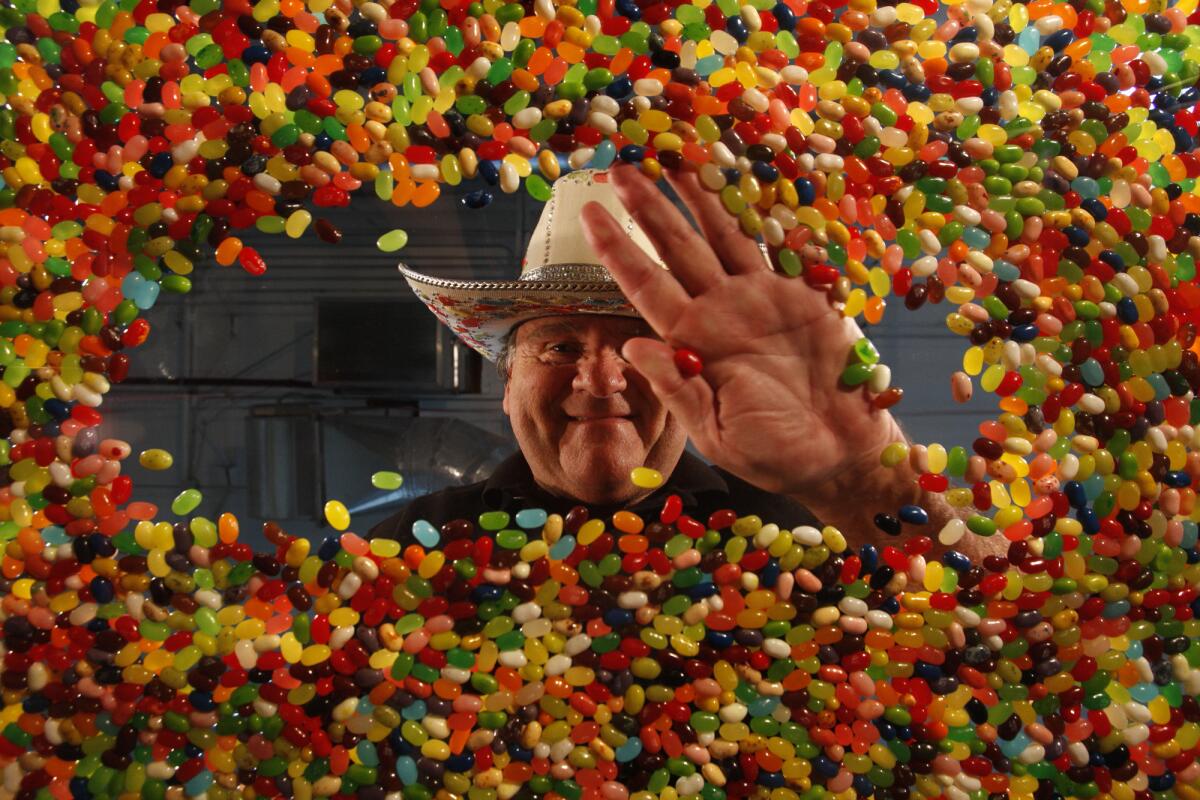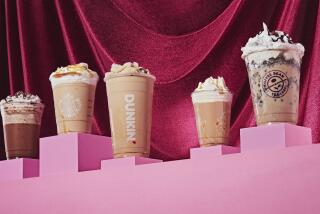Jelly Belly inventor hopes caffeinated jelly beans will fuel his comeback

Jelly Belly jelly bean inventor David Klein, shown in 2011, is looking for a new opening in the candy business.
- Share via
In 1976, candy distributor David Klein came up with a radical idea.
What if there were a store that sold only jelly beans? And what if those jelly beans were flavored both inside and outside, with then-unthinkable flavors like coconut?
That dream became Jelly Belly jelly beans, which Klein eventually sold -- a move he immediately regretted, he said.
See more of our top stories on Facebook >>
Now the 69-year-old Klein is looking to shake up the candy market again with a new project: slightly caffeinated jelly beans flavored like coffee-shop drinks.
He and his business partners have launched a Kickstarter campaign seeking $10,000 to launch their Original Coffee House Beans, which will come in flavors such as hot cocoa and peppermint, chai tea, coffee and doughnuts and caffe macchiato.
“We really wanted to do something for adults, for the gourmet taste buds,” said Klein, a Glendora resident. “Everybody goes to Starbucks or those kinds of places, but nobody has actually made a line of jelly beans that was inspired by the flavors of the coffee that they drink there.”
He might be on to something.
Over the last five years, coffee and snack shop industry revenue has climbed 4.3% a year on average, said Viraj D’Costa, industry research analyst at IBISWorld.
By contrast, in the same period the candy industry’s revenue has dropped 2.3% a year on average as health concerns about sugar consumption eroded profits, especially from the sector’s most lucrative customers: children under 14.
Candy makers have tried to broaden their appeal to adults, some with low-calorie or low-sugar options. Klein’s edge could be with coffee enthusiasts, D’Costa said.
SIGN UP for the free California Inc. business newsletter >>
“Those actually might be things that adults are actually interested in buying,” he said. “He might have a good shot at having a product that fits in to the market.”
Klein said he plans to make the jelly beans in his 10,000-square-foot Covina candy factory, where he currently manufactures sweets such as Sandy Candy and gummies of various shapes.
Using a Kickstarter campaign was appealing because of its immediacy and the promotional aspect, Klein said.
“We have seen people that have been able to fund their business almost immediately, and you don’t have to give up any equity portion,” he said. “We felt with Kickstarter, people would be aware of our product.”
The coffee-flavored beans still could face competition, especially from Klein’s former company. D’Costa said consumers have a great deal of brand loyalty, particularly with large firms.
Klein said he wasn’t worried.
“I actually welcome competition,” he said. “It keeps you on your toes.”
Klein said he has long regretted selling the Jelly Belly trademark in 1980.
Under terms of the sale, Bay Area-based Herman Goelitz Candy Co., which was the contract manufacturer for Jelly Belly, gave Klein and his business partner $10,000 apiece every month for 20 years. Klein said he also had to sign an agreement saying he would not compete for two decades.
Goelitz later took on the name of the famous candy, becoming Jelly Belly Candy Co. Jana Sanders Perry, a company spokeswoman, said she could confirm only the amount of the financial agreement.
For more business news, follow @smasunaga.
ALSO
Yahoo could lay off 10% of its workforce, report says
Apple shares are falling as iPhone sales become a cause for concern
The largest taxi company in Uber and Lyft’s hometown is near bankruptcy
More to Read
Inside the business of entertainment
The Wide Shot brings you news, analysis and insights on everything from streaming wars to production — and what it all means for the future.
You may occasionally receive promotional content from the Los Angeles Times.











